words and expressions
- 格式:doc
- 大小:61.00 KB
- 文档页数:20
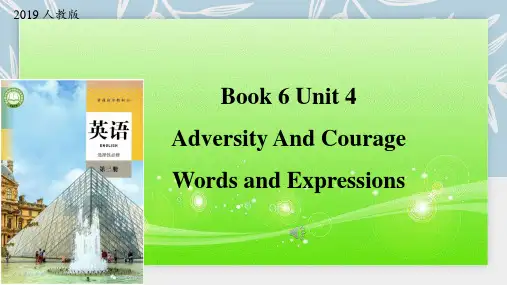
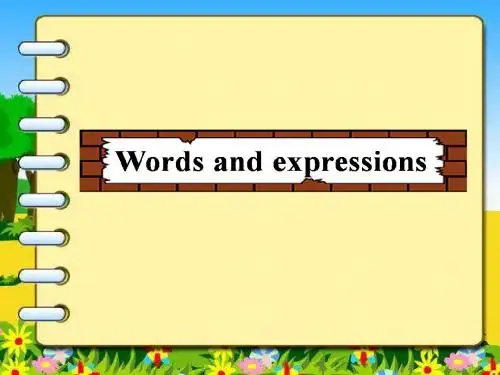
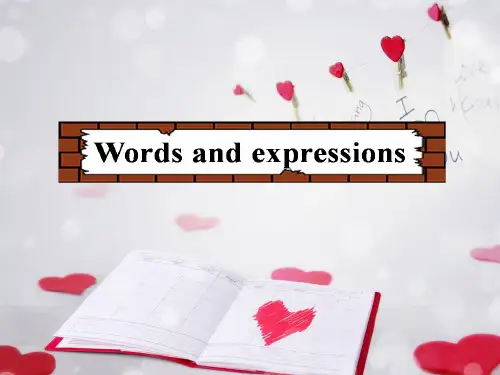

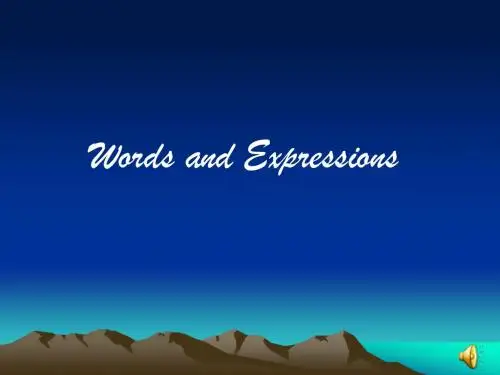
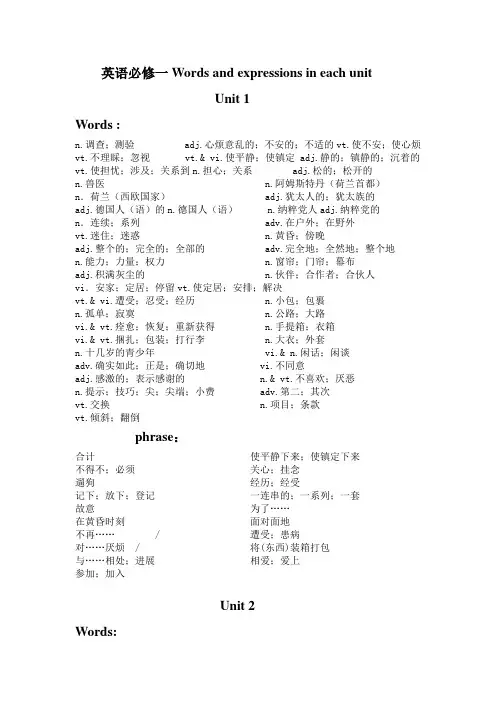
英语必修一Words and expressions in each unitUnit 1Words :n.调查;测验 adj.心烦意乱的;不安的;不适的vt.使不安;使心烦vt.不理睬;忽视 vt.& vi.使平静;使镇定 adj.静的;镇静的;沉着的vt.使担忧;涉及;关系到n.担心;关系 adj.松的;松开的n.兽医 n.阿姆斯特丹(荷兰首都)n.荷兰(西欧国家) adj.犹太人的;犹太族的adj.德国人(语)的n.德国人(语) n.纳粹党人adj.纳粹党的n.连续;系列 adv.在户外;在野外vt.迷住;迷惑 n.黄昏;傍晚adj.整个的;完全的;全部的 adv.完全地;全然地;整个地n.能力;力量;权力 n.窗帘;门帘;幕布adj.积满灰尘的 n.伙伴;合作者;合伙人vi.安家;定居;停留vt.使定居;安排;解决vt.& vi.遭受;忍受;经历 n.小包;包裹n.孤单;寂寞 n.公路;大路vi.& vt.痊愈;恢复;重新获得 n.手提箱;衣箱vi.& vt.捆扎;包装;打行李 n.大衣;外套n.十几岁的青少年 vi.& n.闲话;闲谈adv.确实如此;正是;确切地 vi.不同意adj.感激的;表示感谢的 n.& vt.不喜欢;厌恶n.提示;技巧;尖;尖端;小费 adv.第二;其次vt.交换 n.项目;条款vt.倾斜;翻倒phrase:合计使平静下来;使镇定下来不得不;必须关心;挂念遛狗经历;经受记下;放下;登记一连串的;一系列;一套故意为了……在黄昏时刻面对面地不再…… / 遭受;患病对……厌烦 / 将(东西)装箱打包与……相处;进展相爱;爱上参加;加入Unit 2Words:n.地下人行道;(美)地铁 n.电梯;升降机n.(英)汽油 =(美) n.汽油;气体;煤气;毒气adj.官方的;正式的;公务的 n.航行;航海vt.征服;占领 adj.本国的;本地的 n.本地人;本国人n.(美)公寓住宅;单元住宅 adv.实际上;事实上公元 vt.以……为根据n.基部;基地;基础adj.逐渐的;逐步的 adv.逐渐地;逐步地n.丹麦语adj.丹麦人(语)的 vt.使富裕;充实;改善n.词汇;词汇量;词表 n.拼写;拼法adj.较后的;后半的;(两者中)后者的 n.本身;本体;身份adj.流利的;流畅的 adv.流利地;流畅地n.新加坡(东南亚国家) n.马来西亚(东南亚国家);马来群岛adj.频繁的;常见的 adv.常常;频繁地n.使用;用法;词语惯用法 n.& vt.命令;指令;掌握n.& vt.请求;要求 n.方言n.词语;表示;表达adj.中西部的;有中西部特征的adj.非洲的;非洲人的;非洲语言的 n.鲶鱼adj.西班牙的;西班牙人的;西班牙语的n.西班牙人(语)adj.东方的;东部的 adj.东南方的;来自东南的adj.西北方的;来自西北的 vt.辨认出;承认;公认n.(英)卡车 =(美) n.口音;腔调;重音n.闪电 adv.直接;挺直adj.值得;笔直的;正直的n.街区;块;木块;石块 n.出租车phrase:因为;由于走近;上来;提出现在;目前利用;使用例如……;像这种的扮演一个角色;参与Unit 3Words:n.日记;杂志;定期刊物 n.运送;运输vt.运输;运送vt.更喜欢 n.不利条件;不便之处n.费用 n.路线;路途n.湄公河 vi.流动;流出n.流动;流量vt.说服;劝说 vi.骑自行车vi.毕业n.大学毕业生 adv.最后;终于n.时间表;进度表vt.为某事安排时间 adj.喜爱的;慈爱的;宠爱的n.缺点 adj.顽固的;固执的vt.组织;成立 n.细节;详情n.来源;水源 vt.决定;确定;下定决心adj.坚决的;有决心的 n.旅行;旅程n.海拔高度;高处 n.地图;地图集n.冰河;冰川 n.急流n.山谷;流域 n.瀑布vi.缓慢而行;踱步n.一步;速度;步调 n.三角洲n.弯;拐角vt.使弯曲vi.弯身;弯腰 n.态度;看法n.(指河流等)蜿蜒缓慢流动 n.珠穆朗玛峰vi.(指液体)沸腾;(水)开 n.小包;包裹n.& vt.预测;预报 n.保险n.羊毛;毛织品 adj.可信赖的;可靠的n.风景;视野;观点;见解 n.牦牛n.枕头;枕垫 n.午夜;子夜n.火焰;光芒;热情 prep.在……下面n.老挝(东南亚国家) n.老挝人adj.老挝人的n.庙宇;寺庙 n.洞穴;地窖vt.观看;注视;考虑phrase:自从;自……以后喜爱;喜欢关心;忧虑;惦念改变主意下决心;决定投降;屈服;让步照常在午夜Unit 4Words:n.地震 n.地震n.井 n.裂缝;噼啪声adj.发臭的;有臭味的 n.农场;农家n.管;导管 vi.爆裂;爆发n.突然破裂;爆发n.百万 n.事件;大事n.民族;国家;国民 n.运河;水道n.蒸汽;水汽 n.污垢;泥土vt.断定;判断;判决 n.报刊的大字标题n.废墟;毁灭vt.毁灭;使破产 n.苦难;痛苦adj.极度的 vt.损害;伤害n.幸存者;生还者;残存物 vt.破坏;毁坏;消灭n.砖;砖块 n.水坝;堰堤n.轨道;足迹;痕迹 adj.无用的;无效的;无意的n.快车;速递 n.骑自行车的人vt.& vi.使震惊;震动 n.& vt.援救;营救vt & vi.使开裂;破裂 n.电;电流;电学vt.使陷入困境n.陷阱;困境 n.矿;矿山;矿井n.灾难;灾祸 vt.埋葬;掩埋;隐藏n.矿工 n.休克;打击;震惊n.掩蔽;掩蔽处;避身处 n.标题;头衔;资格n.记者 n.条;棒;条状物n.& vt.损失;损害 vt.使惊吓;吓唬adj.受惊的;受恐吓的 adj.令人恐惧的n.祝贺;(复数)贺词 n.裁判员;法官adv.真诚地;真挚地 vt.表示;表达n.要点;大纲;轮廓phrase:立刻;马上仿佛;好像结束;终结严重受损;破败不堪掘出;发现许多;大量的Unit 5Words:n.质量;品质;性质 adj.热心肠的adj.吝啬的;自私的;卑鄙的 adj.积极的;活跃的adj.慷慨的;大方的 adj.随和的;温和宽容的n.自我;自身 adj.自私的adj.无私的;忘我的 adv.无私地;忘我地vt.(与连用)献身;专心于 adj.忠实的;深爱的n.【圣经】 n.侵略者vt.建设;建立 n.共和国;共和政体n.法则;原则;原理 n.民族主义;国家主义n.生计;谋生 adj.和平的;平静的;安宁的adj.巨大的;庞大的 n.飞跃;跳跃n.人类 n.律师n.指导;领导 adj.法律的;依照法律的n.费(会费;学费等);酬金 n.青年;青年时期n.南非共和国有色人种的身份证 n.同盟;联盟;联合会n.舞台;阶级;时期 n.意见;看法;主张vt.& vi.投票;选举n.投票;选票;表决 vt.进攻;攻击;抨击n.暴力;暴行 adj.相等的;平等的adj.乐意的;自愿的 adj.不公正的;不公平的n.引用语;语录 vt.释放;发行vi.& vt.逃脱;逃走;避开 n.毛毯;毯子vt.教育;训练 adj.受过教育的;有教养的vi.请求;乞求 n.亲戚;亲属n.恐怖;可怕的人;恐怖时期;恐怖活动 n.残忍;残酷n.报酬;奖金vt.酬劳;奖赏 vt.判决;宣判[前缀]反;抗;阻 adj.反黑人的n.系统;会长;校长;行长 adj.怀有希望的;有希望的Phrase:失业青年团事实上使充气;爆炸在危险、受罚、痛苦、忧虑等的处境中求助于;致力于丧失勇气或信心当权;上台设立;建立被判处……(徒刑)诺贝尔和平奖。
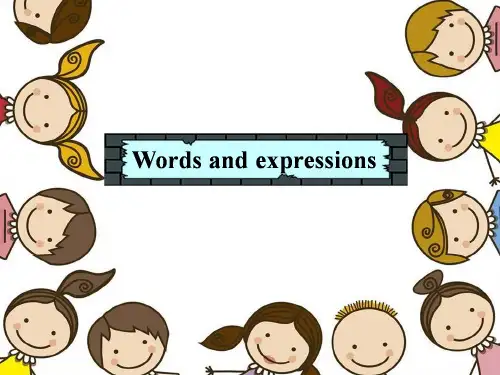
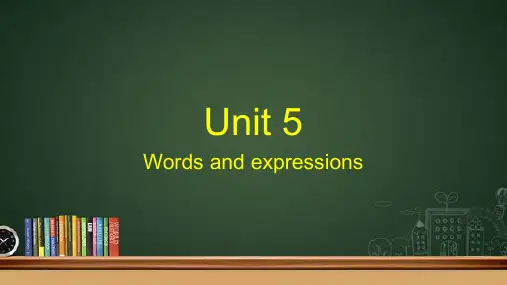
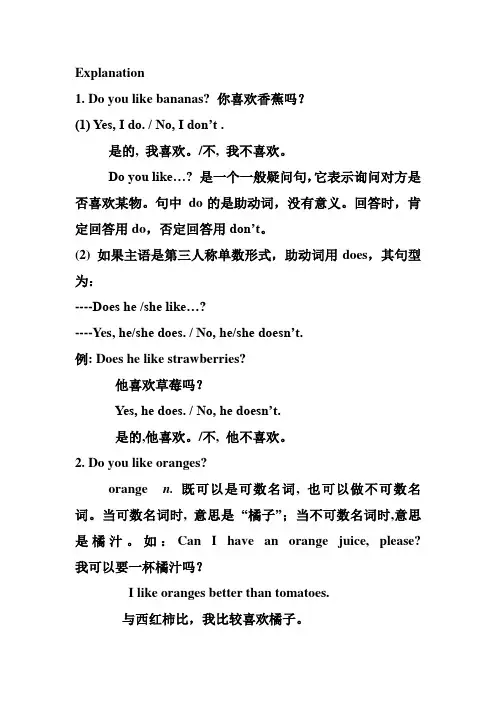
Explanation1. Do you like bananas? 你喜欢香蕉吗?(1) Yes, I do. / No, I don’t .是的, 我喜欢。
/不, 我不喜欢。
Do you like…? 是一个一般疑问句,它表示询问对方是否喜欢某物。
句中do的是助动词,没有意义。
回答时,肯定回答用do,否定回答用don’t。
(2) 如果主语是第三人称单数形式,助动词用does,其句型为:----Does he /she like…?----Yes, he/she does. / No, he/she doesn’t.例: Does he like strawberries?他喜欢草莓吗?Yes, he does. / No, he doesn’t.是的,他喜欢。
/不, 他不喜欢。
2. Do you like oranges?orange n.既可以是可数名词, 也可以做不可数名词。
当可数名词时, 意思是“橘子”;当不可数名词时,意思是橘汁。
如:Can I have an orange juice, please? 我可以要一杯橘汁吗?I like oranges better than tomatoes.与西红柿比,我比较喜欢橘子。
I like bananas. 我喜欢香蕉。
(1)like表示“喜欢”, 是动词。
如果主语是第三人称单数,后要加“s”。
例如: He likes apples. 他喜欢苹果。
(2) 否定形式要在like前加don’t或在likes 前加doesn’t, 同时把likes改为like。
I don’t like bananas. 我不喜欢香蕉。
He doesn’t like apples. 他不喜欢苹果。
Let’s have …这个句型的意思是“让我们吃些/喝些…吧”。
例如: Let’s have some salad.让我们吃些沙拉吧。
Let’s have some French fries.让我们吃些薯条吧。
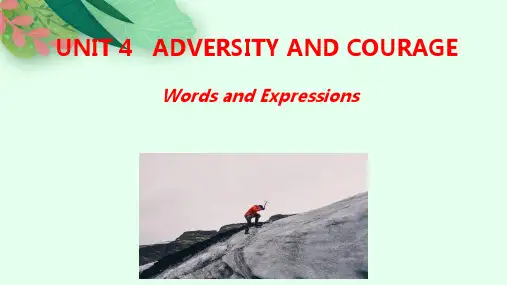
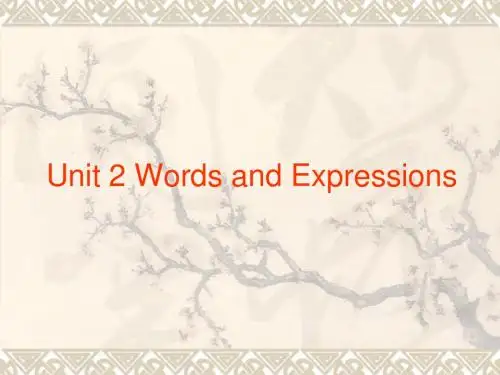
1.They are regarded by all the good wives, far and near, as perfectbarometers.(7)2.When the rest of the landscape is cloudless, they will gather a hood ofgray vapors about their summits, which, in the last rays of the setting sun, will glow and light up like a crown of glory.(8)3.It is a little village, of great antiquity, having been founded by some ofthe Dutch colonists, in the early times of the province.(8)4.He was a descendant of the Van Winkles.(8)5.He was, moreover, a kind neighbor, and an obedient hen-peckedhusband.(8)6.A termagant wife, may, therefore, in some respects, he considered atolerable blessing; and if so, Rip Van Winkle was thrice blessed.7.Whenever they talked those matters over in their evening gossiping, tolay all the blame on Dame Van Winkle.8.Not a dog would bark at him throughout the neighborhood. (9)9.The great error in Rip‘s composition was an insuperable aversion to allkinds of profitable labor. (9)10.H is patrimonial estate had dwindled away under his management, acre byacre. (10)11.R ip Van Winkle, however, was one of those happy mortals, of foolish,well-oiled dispositions, who take the world easy, eat white bread or brown, whichever can be got with least thought or trouble, and wouldrather starve on a penny than work for a pound.(10)12.R ip‘s sole domestic adherent was his dog Wolf, who was as muchhen-pecked as his master. (11)13.W hat courage can withstand the ever-during and all-besetting terrors of awoman‘s tongue? (11)14.I t is true, he was rarely heard to speak, but smoked his pipeincessantly.(13)15.H e would inhale the smoke slowly and tranquilly, and emit it in light andplacid clouds.(13)16.H is only alternative, to escape from the labor of the farm and the clamorof his wife, was to take gun in hand and stroll away into the woods. (13) 17.R ip had unconsciously scrambled to one of the highest parts of theKaatskill Mountain. (13)18.P anting and fatigued, he threw himself, late in the afternoon, on a greenknoll, covered with mountain herbage, that crowned the brow of a precipice.19.R ip now felt a vague apprehension stealing over him. (14)20.T heir visages, too, were peculiar. (15)21.A t length his senses were overpowered, his eyes swam in his head, hishead gradually declined, and he fell into a deep sleep. (16)22.T he birds were hopping and twittering among the bushes, and the eaglewas wheeling aloft, and breasting the pure mountain breeze.(16)23.H e grieved to give up his dog and gun; he dreaded to meet his wife. (17)24.T he constant recurrence of this gesture induced Rip, involuntarily, to dothe same. (17)25.H e found the house gone to decay—the roof fallen in, the windowsshattered, and the doors off the hinges. (18)26.I t was empty, forlorn, and apparently abandoned. (19)27.R ip was equally at a loss to comprehend the question. (20)28.R ip looked, and beheld a precise counterpart of himself, as he went up themountain. (21)29.I n the midst of his bewilderment, the man in the cocked hat demandedwho he was, and what was his name? (21)30.R ip had but one question more to ask; but he put it with a faltering voice.(22)31.He was a descendant of the historian of that name, who wrote one of t heearliest accounts of the province. (22)32.He had got his neck out of the yoke of matrimony. (23)33.The old Dutch inhabitants, however, almost universally gave it fullcredit. (24)34.[…] (1) suspicions did not fail to arise in the minds of some, that he hadprivately (2) made away with his brother, the late king, with the view ofmarrying his widow, […]35.w hat mostly troubled him was an uncertainty about the (3) manner of hisfather‘s death.36.A rumor had reached the ear of young Hamlet, that an (4) apparition,exactly (5) resembling the dead king his father, had been seen by the soldiers upon (6) watch.37.A nd when Hamlet was left alone, he took up (7) a solemn resolution, thatall he had in his memory, all that he had ever learned by books or observation, should be(8) instantly forgotten by him, and nothing live in his brain but the memory of what the ghost had told him, and (9)enjoined him to do.38.A t the representation of this play, the king, who did not know the (10)trap which was laid for him, was (11) present, with his queen and the whole court.39.S he, (12) affrighted at his earnest manner, and fearful lest in his(13)lunacy he should do her a mischief, cried out;40.S oon after the ship was attacked by pirates, and a sea-fight (14)commenced; (15) in the course of which Hamlet, desirous to show his valour, with sword in hand singly (16) boarded the enemy‘s vessel;41.T here was a willow which grew (17) slanting over a brook, and(18)reflected its leaves on the stream. To this brook she came one daywhen she was (19) unwatched, with (20) garlands she had been making,(21) mixed up of daisies and nettles, flowers and weeds together, and (22)clambering up to hang her garland upon the boughs of the willow, […]42.(23) In this instant the queen (24) shrieked out that she was poisoned. Shehad inadvertently drunk out of a bowl which the king had prepared for Hamlet, (25) in case, that being warm in fencing, he should call for drink:43.a nd he (Laertes) told Hamlet of the (26) envenomed point, and said thatHamlet had not half an hour to live, for no medicine could cure him; and begging forgiveness of Hamlet, he died, with his last words accusing the king of being the (27) contriver of the mischief.44.[…] this law was seldom or never (1)put in execution, though perhaps theyoung ladies of that city were not unfrequently (2)threatened by their parents with the terrors of it.45.T heseus, though a great and (3)merciful prince, had no power to (4)alterthe laws of his country; therefore he could only give Hermia four days to consider of it.46.L ysander was in great (5) affliction at hearing these evil tidings; but (6)recollecting that he had an aunt who lived at some distance from Athens, […]47.P uck […] was a shrewed and (7)knavish sprite, that used to play comical(8)pranks in the neighboring villages; […]48.P uck, who loved (9)mischief to his heart, (10)was highly diverted withthis intended frolic of his master, and ran to seek the flower; […]49.B ut it so fell out that Helena came that way, and, instead of Hermia, wasthe first object Lysander (11)beheld when he opened his eyes; and strange to relate, so powerful was the love-charm, all his love for Hermia(12)vanished away, and Lysander fell in love with Helena.50.O beron had learnt by some questions he had asked of Puck, that he had(13)applied the love-charm to the wrong person‘s eyes; and now havingfound the person first (14)intended.51.T hen (15)wink at each other, and hold the sweet jest up. If you had anypity, grace, or manners, you would not (16)use me thus.52.―Sleep, then,‖ said the queen, ―and I will (17)wind you in my arms. O,how I love you! How I (18)dote upon you!‖53.I t was soon agreed that, as Demetrius had given up his (19)pretensions toHermia, he should endeavor to prevail upon her father to (20)revoke the cruel sentence of death which had been passed against her.54.T he fairy king and queen, who were (21) invisible (22)spectators of this(23)reconciliation, and now saw the happy ending of the lover s‘ history,[…]55.a nd now, if any are (24)offended with this story of fairies and their pranks,as judging it (25)incredible and strange, they have only to think that they have been asleep and dreaming, and that all these adventures were(26)visions which they saw in their sleep.1. __________ And God said, ―Let there be an expanse between thewaters to separate water from water.‖2. __________ And God said, ―Let the water teem with living creatures, …‖3. __________ God made the wild animals according to their kinds, the livestock according to their kinds, …4.__________This is the account of the heavens and the earth when they were created.5. __________ Now the serpent was more crafty than any of the wild animals the LORD God had made.6. __________So Cain was very angry, and his face was downcast.7. __________Noah was a righteous man, blameless among the people of his time, …8. __________ __________ __________ Everything on earth will perish. But I will make a covenant with you, and you will enter the ark…9. __________ Then Noah built an altar to the LORD and, taking some of all the clean animals and clean birds, he sacrificed burnt offerings on it. 10. __________ These were the three sons of Noah, and from them came the people who were scattered over the earth.11. __________ __________ __________ From these the maritime peoples spread out into their territories by their clans within their nations, each with its own language.12. __________Now Sarai was barren; she had no children.13. __________ Now there was a famine in the land, and Abram went down to Egypt to live there…14. __________ But the LORD inflicted serious diseases on Pharaoh…15. __________… Lot lived among the cities of the plain and pitched his tents near Sodom.16. __________ During the night Abram divided his men to attack them and he routed them…17. __________ O Sovereign LORD, what can you give me since I remain childless…18. __________ He slept with Hagar, and she conceived.19. __________ Abram fell facedown, and God said to him.20. __________ Every male among you shall be circumcised.21. __________ __________ __________ Abraham and Sarah were already old and well advanced in years, … (Sarah) I am worn out and my master is old, …22. __________ __________ The outcry against Sodom and Gomorrah is so great and their sin so grievous…23. __________Far be it from you to do such a thing –to kill the righteous with wicked…24. __________ __________ ―This fellow (Lot) came here as an alien,and now he wants to play the judge! …‖25. __________ So Lot went out and spoke to his sons-in-law, who were pledged to marry his daughter.26. __________ __________ … and he (God) brought Lot out of the catastrophe that overthrew the cities where Lot had lived.1. ____________________ ―You are as good as dead because of the woman you (Abimelech) have taken; she is a married woman.‖2. ____________________ ―I (Abimelech) have done it with a clear conscience and clean hands.‖3. __________ ―Now return the man‘s wife; for he (Abraham) is a prophet, …‖4. __________ ―I (Abraham) said to myself, ‗There is surely no fear of God in this place (Gerar), …‘‖5. __________ ―This is to cover the offense against you before all who are with you; you (Sarah) are completely vindicated.‖6. __________ Now the LORD was gracious to Sarah as he had said, …7. __________ __________ ―Sell me (Abraham) some property for a burial site here so I can bury my dead.‖8. __________ __________ ―… listen to me and intercede with Ephron son of Zohar on my behalf…‖9. ________________________________________ ―…the land is worth four hundred shekels of silver, but what is that between me and you?...‖10. __________ Abraham… weighted out for him the price he hadnamed… according to the weight current among the merchants.11. __________ ―Do not detain me (the chief servant of Abraham), …‖12. ____________________ Isaac, who had a taste for wild game, lovedEsau, …13. __________ __________ So Esau despised his birthright.14. ____________________ Then Laban said to him, ―You (Jacob) aremy own flesh and blood.‖15. __________“I am the God of Bethel, where you anointed apillar…”16. ____________________ Now Rachel had taken the householdgods…17. ____________________ ―Get rid of the foreign gods you have withyou, …‖1.Ray was an altogether serious man and had a little sharp-featured wifewho had also a sharp voice.2.The two, with half a dozen thin-legged children, lived in a tumble-downframe house beside a creek…...3.They said that old Windpeter stood up on the seat of his wagon, ravingand swearing at the onrushing locomotive, and that he fairly screamed with delight when the team, maddened by his incessant slashing at them…...4.Most boys have reasons of wishing they could die gloriously instead ofjust being grocery clerks and going on with their humdrum lives.5.Hal was the worst of the lot and always up to some devilment.6.With the money he bought himself a suit of cheap, flashy clothes.7.Hal went to work on the Wills farm because there was a country schoolteacher out that way who had taken his fancy.8.Everyone who heard of his infatuation for the school teacher was sure itwould turn out badly.9.Ray, who was the more sensitive and always minded things more, hadchapped hands and they hurt.10.……and how the low hills are splashed with yellows and reds you wouldunderstand his feeling.11.H is marriage had come about through one of his days of wandering.12.H e had induced a girl who waited on trade in his father‘s shop to go withhim and something had happened.13.H al tried to keep on laughing but he too was in an earnest mood.14.―Has he got to be harnessed up and driven through life like a horse?‖15.―……Perhaps you‘ve been in the same fix yourself……Shall I do it orshall I tell Nell to go to the devil……‖16.A t half-past four that afternoon Ray was puttering about the barnyardwhen his wife came up the lane along the creek and called him.17.H e had already done the evening chores and had seen Hal, dressed andready for a roistering night in town……18.A long the paths to his own house he trudged behind his wife, looking atthe ground and thinking. He cou ldn‘t make out what was wrong.19.T hen as he ran he remembered his children and in fancy felt their handsclutching at him.20.R ay Pearson lost his nerve and this is really the end of the story of whathappened to him.21.…and there it stayed, propped up on two wooden boxes beside thefeed-room door.22.T he hook at the side was stuck fast.23.P erhaps it is the way God opens houses at dead of night when He istaking a quiet turn with an angel…24.…beds with real bedclothes…25.B ut what Kezia liked more than anything, what she liked frightfully, wasthe lamp.26.T he father and mother dolls, who sprawled very stiff as though they hadfainted in the drawing-room…27.T hey burned to tell everybody, to describe, to-well-to boast about theirdoll‘s house before the school-bell rang.28.N ot to stay to tea, of course, or to come traipsing through the house.29.T hey only just had time to whip off their hats and fall into line before theroll was called.30.T he girls of her class nearly fought to put their arms around her, to walkaway with her, to beam flatteringly, to be her special friend.31.…and as they set the fashion in all matters of behavior, the Kelveys wereshunned by everybody.32.S o they were the daughters of a washerwoman and a gaolbird.33.W hy Mrs. Kelvey made them so conspicuous was hard to understand.34.L il, for instance, who was a stout, plain child, with big freckles…35.A nd her little sister, our Else, wore a long white dress, rather like anightgown, and a pair of little boy‘s boots.36.S he was a tiny wishbone of a child, with cropped hair and enormoussolemn eyes—a little white owl.37.S he went through life holding on to Lil, with a piece of Lil‘s skirtscrewed up in her hand.38.W hen the little girls turned around and sneered, Lil, as usual, gave hersilly, shamefaced smile, but our Else only looked.39.―Yah, yer father‘s in prison!‖ she hissed, spitefully.40.O ur Else was looking at her with big, imploring eyes; she was frowning;she wanted to go.41.P resently our Else nudged up close to her sister. But now she hadforgotten the cross lady. She put out a finger and stroked her sister‘s quill;she smiled her rare smile.42.T hey seemed to be losing ground, somehow, losing hope as the monthswent by.(6)43.S he was spellbound—she knew he knew her.(7)44.S he did not so much think of him: she was possessed by him.(8)45.S he saw his dark, shrewd, unabashed eye looking into her, knowing her.(8)46.S he examined her gun, and cleaned it, musing abstractedly by thelamplight. (8)47.A nd she proceeded to forget about it, except that she was more indignantthan ever at the impudence. (8)48.T hey dreaded the almost continuous darkness that enveloped them ontheir desolate little farm near the wood. (9)49.T here heard a footstep—distinctly a footstep. Banford recoiled in fear.(10)50.H aving his heavy sack on his shoulders, he stooped, thrusting his headforward.(10)51.B ehind her, banford, clinging to sofa-arm, was shrinking away, withhalf-averted head. (11)52.She racked her brain to think of something else to put on the tray. (12)53.He continued to answer with courteous simplicity, grave and charming.(14)54.At last the talk dwindled. The youth relaxed his clasp of his knees. (15)55.She awoke with the pain of it, and lay trembling as if she were reallyseared. (17)56.When he thought of her dark, startled, vulnerable eyes he smiled subtlyto himself. (20)57.I f he was not careful, she would turn around on him with her savage,sardonic ridicule, and dismiss him from the farm and from her own mind forever.(21)58.Y our own fate overtakes and determines the fate of the deer your arehunting. (21)59.H e was not quite sure how he would go on. And March was suspicious asa hare. (22)60.M arch felt rather than heard him. She was trying in vain to turn aside herface. (22)61.‗Oh, I can‘t,‘she wailed helplessly, half-articulate, as if semiconscious,and as if in pain, like one who dies. ‗How can I?‘(23)62.T hey went in to tea. March was quite mute. Her face was pale andstrained and vague. (24)63.B ut March had again gone vague and unheeding, chewing her food as ifshe did not know she was eating at all. (25)64.‗Yes, I suppose so,‘ said March laconically. She would never confess tothe fox. (28)65.―I‘m going to bed, Nellie, I‘m all nerves tonight. Are you coming?‖ (28)66.At that moment Banford‘s voice was heard calling fretfully, crosslyfrom upstairs.(30)67.She looked up at him, and a deep pink color flushed over her face. (31)68.But again she flushed with an agonized flush. She, too, could swallowno more. (32)69.Her plaintive, fretful voice had a thread of hot anger and despair. (32) 1.But Henry sat on, stiff with temper. He took no notice of her. She hadregained her composure and her soft, even creamy complexion. (33) 70.They sat each one at the sharp corner of a triangle, in obstinateremoteness. (33)71.I f you marry him he‘ll just make a fool of you. He‘ll go off and leave youstranded. (34)72.T he boy outside could hear the stifled sound of the woman‘s sobbing, andcould hear March‘s soft, deep, tender voice comforting, with wonderful gentleness and tenderness, the weeping woman. (35)73.A nd suddenly it seemed to him England was little and tight, he felt thelandscape was constricted even in the dark. (36)74.And at the same moment there was the awful crash of a gunreverberating between the old buildings, as if all the night had gone smash. (37)75.March was in agony and dazed bewilderment, looking for something toline the box with. (38)76.She pursed her lips, and her eyes went black and vacant. Then she tookthe head in her hand. (38)ter in the day she saw the fox‘s skin nailed flat on a board, as ifcrucified. It gave her an uneasy feeling. (39)1.‗Would you rather stay over here while I go first?‘ he asked.‗I would, if that‘s the only alternative,‘ she replied. (41)2.There was again the queer, sardonic look about her; she would mockstoically at everything he said or which life offered. (42)3.‗I should think not, indeed,‘ cried Banford indignantly.At bed-time Banford said plaintively to March.(42)4.‗Why don‘t you let me help you with the parcels?‘ She had a queer,plaintive hitch in her voice. Then came March‘s robust and reckless.(43)5.‗Don‘t you worry yourself, nobody‘s going to treat me cheaply. And evenyou aren‘t, either.‘She had a tender defiance and a certain fire in her voice.(44)6.A curious quietness and gravity came over his soul. He felt a man, quiet,with a little of the heaviness of male destiny upon him.(47)7.His voice had so much anger and contempt and fury in it as he spoke toBanford: and so much tenderness and proud authority as he spoke to March. (49)8.And the signal paralysed her. It beat upon her very soul, and made herhelpless.(50)9.Since he had realized that she was a woman, and vulnerable, accessible, acertain heaviness had possessed his soul. (51)10.‗Oh, you‘ve settled it, have you! Well, I hope you won‘t live to repent it,‘said Banford. (54)11.S o the boy‘s eyes stared fixedly as the train drew away, and she was leftfeeling intensely forlorn. (55)12.H e took no heed of all March‘s outpouring: none. (57)13.Away across, on the green horizontal approach, a figure was justswinging on to a bicycle again, and lurching up and down over the grass, approaching. (59)14.March craned her head to look. She alone recognized the khaki figure.She flushed, but said nothing.(59)15.‗Well, I must say, we weren‘t expecting you,‘ said Banford laconically.(60)16.‗No, it‘s just possible the tree might, though,‘ he answered soberly. (63)17.There was a moment of pure, motionless suspense, when the worldseemed to stand still. (63)18.He stood up. March was standing there petrified and absolutelymotionless. (64)19.And in her dark, vacant eyes was a sort of wound, and her face looked alittle peaked. (65)1. …and the farm on her hands for four years more by the lease, with half the stock on it dead, or sold off one by one to pay the more pressing debts, and with no money to purchase more, or even to buy the provisions needed for the small consumption of every day.2. …his coming seemed to loosen the tears, and she cried day and night, till my aunt and the other watcher looked at each other in dismay, and would fain have stopped her if they had but known how.3. And then she threw herself on my aunt‘s neck, and told her that William Preston had asked her to marry him, and had promised to take good charge of her boy, and to let him want for nothing, neither in the way of keep nor of education, and that she had consented.4. One day, he gave way to his temper, and cursed and swore at Gregory, who had got into some mischief, as children will;5. But he was a man who liked better to be angry than sorry, so he soon found out that it was all Gregory‘s fault, and owed him an additional grudge for having hastened my birth.6. After a time, I overcame my original weakness of constitution, and was just a bonny, strong-looking lad whom every passer-by noticed, when my father took me with him to the nearest town.7. and utterly unreasonable as this may seem, I believe my father rather cherished his feeling of alienation to my brother as a duty, than strove to repress it.8. but the habit of being considered in all things, and being treated as something uncommon and superior, made me insolent in my prosperity, and I exacted more than Gregory was always willing to grant, and then, irritated, I sometimes repeated the disparaging words I had heard others use with regard to him, without fully understanding their meaning.9. ―I can go no farther,‖ I said, in a drowsy tone. I remember I suddenly became dogged and resolved.10. A look passed from one to another —my father‘s stern old face strove in vain to keep its sternness; his mouth quivered, his eyes filled slowly with unwonted tears.11. How, on that fatal night, my father —irritated by my prolongedabsence, and probably more anxious than he cared to show, had been fierce and imperious, even beyond his wont, to Gregory; had upbraided him with his father‘s poverty, his o wn stupidity which made his services good for nothing.。